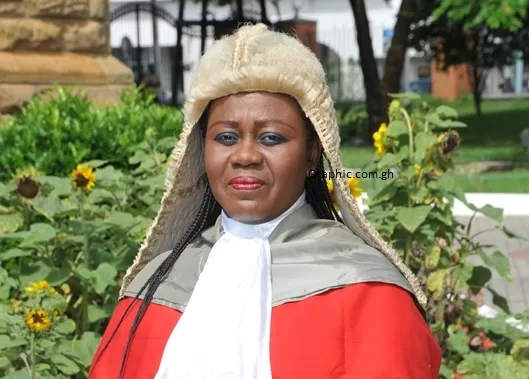Chief Justice of the Republic of Ghana, Justice Gertrude Araba Esaaba Sackey Torkornoo, has filed two separate applications at the Community Court of Justice of the Economic Community of West African States (ECOWAS), alleging grave violations of her human rights following her controversial suspension from office in April 2025.
The legal action, filed on Friday, July 4, 2025, in Abuja, Nigeria, was initiated by renowned Nigerian human rights lawyer, Femi Falana SAN, of Falana & Falana Chambers, on behalf of the embattled Chief Justice. The applications — one substantive and one for provisional measures, challenge what Justice Torkornoo describes as a flagrant denial of her right to a fair hearing, guaranteed under both Ghana’s 1992 Constitution and the 1991 ECOWAS Court Protocol.
According to the Chief Justice, the decision by President John Dramani Mahama to suspend her from office without supplying the basis or reasoning behind a purported prima facie finding violates principles of justice and due process.
She contends that she was not served with a copy of the prima facie determination nor the reasons underpinning it. In her application, she argues that the President’s letter dated April 22, 2025 — which communicated the suspension — lacked legal reasoning and failed to meet the required standards for judicial objectivity.
“Fairness implies that the President, in making the prima facie determination with the Council of State, must specify the particular charges in respect of which a prima facie case is deemed to have been established and the reasons for the same. The President’s letter failed to do this,” the application reads.
Justice Torkornoo is asking the ECOWAS Court to issue ten distinct reliefs, including:
1. A declaration that her suspension violated her right to a fair hearing as guaranteed under Article 7 of the African Charter on Human and Peoples’ Rights.
2. A finding that the panel established by the government to investigate her lacks independence and impartiality.
3. A declaration that the process violated her right to dignified and satisfactory conditions of service (Article 15 of the Charter).
4. An acknowledgment that the suspension has subjected her to public ridicule and damaged her reputation.
5. An order for the Republic of Ghana to establish clear procedural rules for disciplining a sitting Chief Justice.
6. An order lifting the suspension and restoring her to office.
7. An order halting the current inquiry into her conduct unless it complies with due process and fair hearing standards.
8. A compensation package of $10 million for reputational and moral damage.
In addition to the main application, Justice Torkornoo is requesting that the Court immediately impose four precautionary measures, including:
• A suspension of the disciplinary proceedings until the case is heard on its merits.
• Restoration of her official privileges and entitlements as Chief Justice.
• An injunction against any further actions that could worsen the dispute or undermine the Court’s eventual ruling.
• An urgent hearing to ensure Ghana acts in line with any interim orders.
Per the ECOWAS Court’s procedural rules, the Republic of Ghana — represented by the Minister of Justice and Attorney General — has five days to respond to the motion for provisional measures and 30 days to respond to the main application.
Background to the Crisis
Justice Torkornoo’s suspension on April 22, 2025, stemmed from three separate petitions submitted to President Mahama, calling for her removal on grounds of misconduct and incompetence. Petitioners included the civil group Shining Stars of Ghana, private citizen Daniel Ofori, and ACP Ayamga Yakubu Akolgo of the Ghana Police Service.
The Chief Justice has previously rejected the legitimacy of the proceedings. In a national statement on June 25, 2025, she disclosed that the disciplinary panel failed to serve her with relevant documents and refused to acknowledge her legal representation, despite issuing hearing notices addressed to her lawyer.
Legal analysts say this case could have far-reaching consequences not only for Ghana’s judiciary but also for the interpretation of due process rights in West Africa.
The ECOWAS Court is expected to issue preliminary directions on the motion for provisional measures in the coming days.

